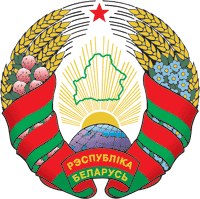Independence Square, Minsk
| Plošča Niezaliežnasci | |
 The square in 2005 | |
 | |
| Native name | Плошча Незалежнасці Error {{native name checker}}: parameter value is malformed (help) |
|---|---|
| Former name(s) | Lenin Square |
| Type | Square |
| Maintained by | Minsk Mayor’s Office |
| Area | 7 hectares (70,000 m2)[1] |
| Location | Independence Avenue, Minsk |
| Nearest metro station | Minsk Metro |
| Construction | |
| Construction start | 1964 |
| Completion | 2002 |
| Other | |
| Designer | Iosif Langbard |
| Known for | The Central Square in Minsk |
Independence Square (Belarusian: Плошча Незалежнасці, Russian: Площадь независимости) is a square in Minsk, Belarus. It is one of the landmarks on Independence Avenue. The Supreme Soviet of Belarus and Minsk City Hall are on this square. During the period of the Byelorussian Soviet Socialist Republic it was called Lenin Square. It is currently one of the biggest squares in Europe.[2]
History

The square was designed by Iosif Langbard and was created for conducting rallies and to serve as Minsk's main ceremonial venue during the Soviet times. During World War II most building that were on the square were destroyed by the Nazis. From 1946 to 1984 October square replaced Lenin Square as the city's main venue. A project for the reconstruction of Independence Square was launched after the fall of the USSR. The first stage of was completed in the year of 2002. The transportation scheme of the area was then changed. Two more pedestrian underpasses were constructed and in the future they are to make part of the Underground Trade Centre.
Several parking lots are to be built adjacent to the square. An underground shopping mall is also being constructed near the square.
Events
Parades
- In the Soviet era military parades in honor of May 1(until 1969), Victory Day, and the October Revolution took place on the square since it was used as the parade venue in 1984. The First Secretary of the Communist Party and members of the politburo would get on top of a grandstand in front of a statue of Lenin. These parades would go on until 1989.
- The first parade of the Republic of Belarus was on Independence Square on June 8, 1997 in honor of independence day.[3]
Demonstrations
- a rally took place in honor of the 100th birthday of Vladimir Lenin on the square on 22 April 1970.[4]
- Rallies in honor of Minsk's 900th anniversary took place in 1967.
Landmarks
Buildings
| Building | Architectural details | Function(s) |
|---|---|---|
Supreme Soviet  Government House #1 Government House #1 |
It stands behind a statue of Vladimir Lenin.It is one of the view buildings that survived the Great Patriotic War(WW2).[5] It was Built in 1934 by Iosif Langbard.[5] | It is one of the highest organs of state power in Belarus.[6] The Supreme Council is the continuation of the Supreme Soviet of the BSSR. It acts as the functioning parliament for Belarus. |
Church of Saints Simon and Helen 
|
This church was created by architects from Poland Tomasz Pajzderski and Wladyslaw Marconi. Construction started in 1905 and was completed in 1910. It is also known as the Red Church for its red exterior made up of bricks from Częstochowa. | It is a Roman Catholic church in Minsk.[7] In the Soviet times the church was used as a cinema. Mass is celebrated in the church in Belarusian, Polish, Lithuanian, and Latin. |
Belarusian State University |
It was created by architects I. Zaporozhets and G. Lavrov. The main building of BSU was completed in 1962.[5] There are 16 Faculties within BSU. 4 of those institutes are Educational Institutes that provide training on either undergraduate or post-graduate levels of education.[8] | The BSU is a higher education university in Minsk. |
| Minsk City Council | The City council was made by architects S. Musinski and G. Sysoev in 1964.[5] | The Council decides on economy, market reforms, external economic activity enterprises and organizations of transport and communication, housing, communal services and power engineering, city planning, services industry, public health services, physical training, sport and tourism, education and culture, social security and public relations.[9] |
Others
- Maxim Tank Belarusian State Pedagogical University
- Minsk Metro headquarters
- Minsk Mayor’s Office
- Former commercial apartment buildings of the early 20th century
- Lenin Statue outside the Government headquarter
- GUM Shopping Center
Lenin Statue
The Lenin statue is right in front of the Supreme Soviet building.
References
- ^ "Places to see in Minsk: exciting tourist attractions, museums, picturesque parks… | Belarus.by". www.belarus.by. Retrieved 2017-01-24.
- ^ "Places to see in Minsk: exciting tourist attractions, museums, picturesque parks… | Belarus.by". www.belarus.by. Retrieved 2017-01-24.
- ^ WarsawPactGuy1985 (2017-01-07), 1997 Belarusian Independence Day Parade, retrieved 2017-01-08
{{citation}}: CS1 maint: numeric names: authors list (link) - ^ minskiy100 (2013-11-06), 100 лет Ленина в Минске, retrieved 2017-01-08
{{citation}}: CS1 maint: numeric names: authors list (link) - ^ a b c d "Stalinist architecture of Minsk". www.comtourist.com. Retrieved 2017-01-22.
- ^ "03491". knowbysight.info. Retrieved 2017-01-22.
- ^ "Чырвоны касцёл - Красный костел - chyrvony.by". Чырвоны касцёл. Парафія Св. Сымона і Св. Алены ў Мінску (in Belarusian). Retrieved 2017-01-22.
- ^ "Organisations: Belarusian State University: Belarusian State University, Minsk, Belarus". www.mathnet.ru. Retrieved 2017-01-22.
- ^ "Home — Minsk city executive committee". minsk.gov.by. Retrieved 2017-01-23.

